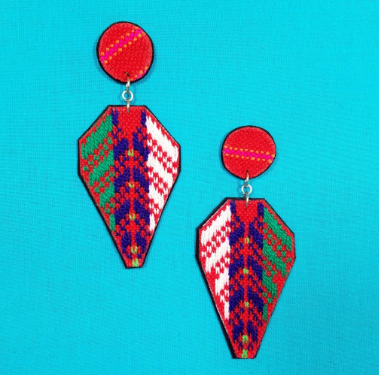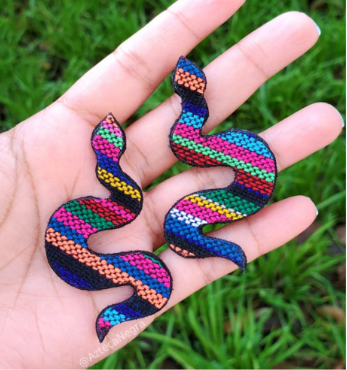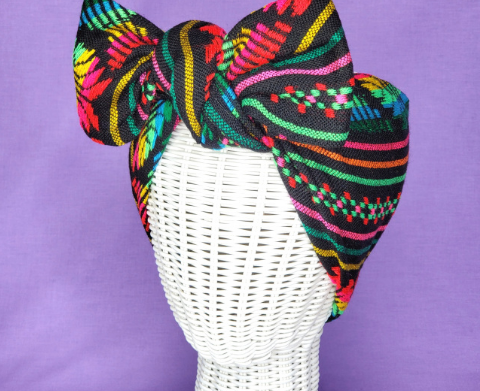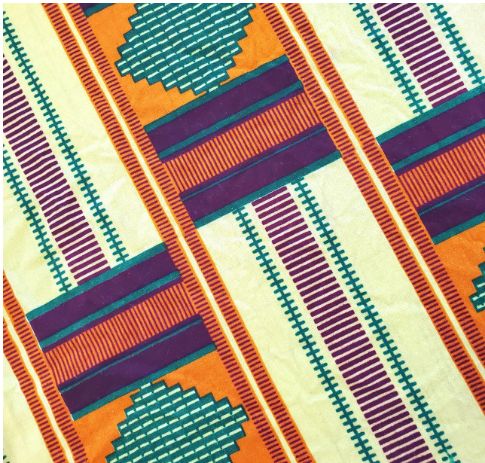Marisol Catchings was born in the San Francisco Bay area, California, USA, but her roots are Chicano and black –she herself calls them so–.
Catchings is 31 years old. She is the owner of the Azteca Negra online company, which produces and sells “culturally-conscious” textiles and handmade jewelry, accessories, and novelty pieces.” “Azteca Negra is where indigenous and modern art, fashion, and culture intersect,” she states on the business website.
” I’m Mexican, and Black,” Catchings told El Telecote’s J. Conterez. “And I really didn’t see anything in the world that I felt was representative of me. I know that I’m not the only person in the world that feels like I didn’t have anything [to represent me], so I started creating pieces to help empower other people.”
Her pieces, then, combine motifs from her two heritages.

“I have been blessed to come from a long line of beautiful, multifaceted women artisans, and use my firmly rooted ancestral identity to design pieces that merge culture, modern art, geometric principles and traditional textiles,” Catchings details on Azteca Negra website.

Catchings told NBC Latino’s Julian Shen-Berro that the inspiration comes from a desire to “help others feel seen,” because, she added, the African influence in Latin America “is often overlooked or hidden.” Catchings says her Mexican and black heritage instills feelings of love and happiness, and that’s why she wants others to feel the same way with her products, because they would “get to wear something really awesome that they feel represents themselves.”
According to Azteca Negra’s website, the pieces have “original designs, and crafted using handpicked, cultural textiles, natural beads, and 100% upcycled leather. “Azteca Negra believes that it is important to conserve our resources, and uses upcycled/ reclaimed and eco-friendly crafting materials when possible”, the website adds.
Since Catchings founded the business in 2013, hair wraps have been a leading brand in its product line.

“We’re constantly told so many negative messages about our hair, and the texture, but what I love about these wraps is that everytime I wrap them on someone, they get so excited about how they look. It’s a way to reclaim. It’s a way to protect yourself, and a way to make yourself feel beautiful,”she told El Tecolote.
When the coronavirus pandemic began, Catchings turned to masks.
At first she and her mother Norma Saavedra made them just to donate to health care workers and those most exposed to the coronavirus because of their type of occupation.
“What we are doing is something that there is a need for, but also one that feels very good from the heart to be able to do something for the people who need it,” Saavedra told Telemundo on April 1, at the height of the coronavirus pandemic.
At the time, Catchings said that the number of health workers asking for donations was growing, which he said showed “the great shortage we have in the country.”
Donations are still available and healthcare personnel can request them through the Azteca Negra website. Catching only asks to cover the $4 shipping.
The masks are made of pre-washed, pre-shrunk cotton fabric, with four layers, and they reversible and washable. They do not replace N95s, they warn, “but they can help reduce the spread of germs.” That is why they recommend that they be used with surgical masks, whenever possible.
Azteca Negra is also creating a line of masks for sale, with the same features of the ones they donate.

Marisol Catchings is co-founder of Just Be, an association in Oakland that since 2016 brings together more than 500 Black women entrepreneurs – that’s how they identify themselves – from the Bay Area, to help “connecting Black Women to business plan training programs, funding opportunities, and clients.” “Most importantly we have worked deeply to empower each other to keep going even when it seems like there is no light on the other side,” they state on their website.
And they add: “There is plenty of money and resources to solve the worlds most biggest problems. We just have to shift our business thinking away from competition and toward collaboration. We are all in this together.”
All photos taken from Azteca Negra‘s website, except from main photo, which was taken from their Instagram
